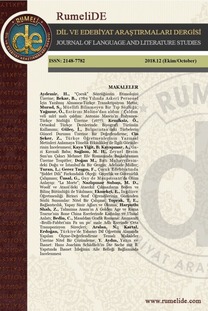Rus dilinde analitik ve sentetik gelecek zaman yapılarının görünüş ve kiplik anlamları
Zaman kategorisi, gelecek zaman, gramer anlami, gramer formu, Rusça, görünüş
Aspect and modality meanings of analytical and synthetic future forms in the Russian language
Tense category, future forms, grammatical meaning, grammar form, Russian, aspect,
___
- Bondarko, A.V. (1962), “Sistema glagolnıh vremyon v sovremennom russkom yazıke”. Voprosı yazıkoznaniya, No 3, 27-37.
- Bradley, B.C. (1911), “”Shall and Will. A Historical Study”. Transactions and Proceedingd of the American Philological Association Vol. 42, 5-31.
- Çebışev, F.A. (2016), “Buduşee vremya glagola i ego svyaz s semantikoy ojidaniya”. Vestnik Vyatskogo gosudarstvennogo universiteta, № 10, 102-106.
- Çuykova, O. Yu. (2019), Buduşee vremya v russkom yazıke: semantika, pragmatika i kontekst. Jezyk i metoda, № 6, 233-242.
- Dalkılıç, L.Ç. (2013), Formı prostogo buduşevo vremeni v znaçenii neaktualnogo nastoyaşevo v sovremennom russkom yazıke. Dissertatsiya na soisk. uçenoy stepeni kand. fil. nauk, St. Petersburg.
- Dalkılıç, Leyla Ç. (2018), Rus dilinin grameri. Ankara: Gece kitaplığı.
- Dalkılıç, L.Ç. (2018), “Rusça ve Türkçedeki Zarf-Fiil Yapılarındaki Anlamsal Özellikler ve Zaman Kavramı”. DTCF. Cilt 58/2, 1184-1210.
- Fries, C. C. (1925), “The Periphrastic Future with Shall and Will in Modern English”. PMLA, Vol 40. No Dec. 4., 963-1024.
- Glovinskaya M.Ya. (1982). Semantiçeskie tipı vidovıh protivopostavlenii russkogo glagola. Moskva: Nauka.
- İzraileviç E.S., Kaçalova K.N. (2003). Praktiçeskaya grammatika angliyskogo yazıka v dvuh tomah. Kiev: Metodika.
- Maslov Yu.S. (2004). İzbrannıe trudı. Aspektologiya. Obşee yazıkoznanie. Moskva: yazıkı slavyanskoy kulturı.
- Kolesov V.V. (2010). İstoriçeskaya grammatika russkogo yazıka. St. Petersburg: SPbGU.
- Koşevaya İ.G. (2016). Tipologiçeskie sturkturı yazıka. Sfera vido-vremennıh znaçeniy. Moskva: Lenand.
- Selişev A.M. (1952). Staroslavyanskiy yazık. ç.II. Moskva: Uçpedgiz.
- Şelyakin M.A. (2008). Kategoriya aspektualnosti russkogo glagola. Moskova: izd. LKİ.
- Skvortsova G.L. (2005). Upotreblenie vidov glagola v russkom yazıke. Russkiy glagol. Moskva: Russkiy yazık. Kursı.
- Teoriya funktsionalnoy grammatiki: aspektualnost, vremennaya lokalizovannost, taksis. (2007). Moskva: Komkniga.
- ISSN: 2148-7782
- Yayın Aralığı: 6
- Başlangıç: 2014
- Yayıncı: Yakup YILMAZ
Ölü Canlar (Мёртвые души) ve İlahi Komedya (Divina Commedia). Çeviride metinlerarası bağlantılar
Ölü Ozanlar Derneği’nde yaratıcı öğretim metodolojisinin rolü
Müsebbib üzerine (Safvet Nezihi’nin kaleminden II. Abdülhamit dönemi)
Talha GÖKTENTÜRK, İbrahim DEMİR, Ali Fuat ARICI
Adlî Dîvân’ında çözümlü muammalar
Marteniçka: Bulgaristan’dan Türkiye’ye bir nevruz geleneğinin göçü
Yabancı dil olarak Türkçe öğretiminde yazma becerisi ve kazanım ilişkisi
Refik Halit Karay’ın “Eskici” öyküsü ve coğrafya algısında değişim
Yabancı dil olarak Türkçe ders materyallerinde Türk ve Türkiye imajına ilişkin unsurlar
